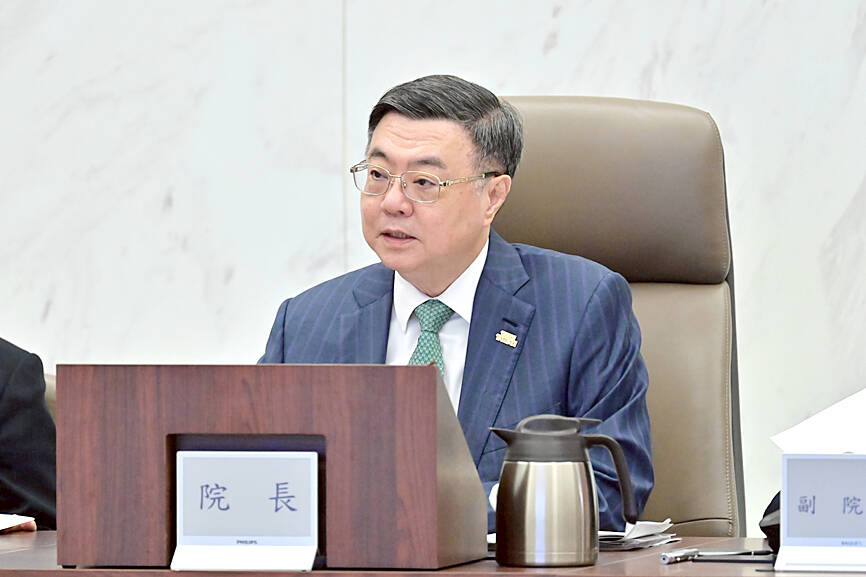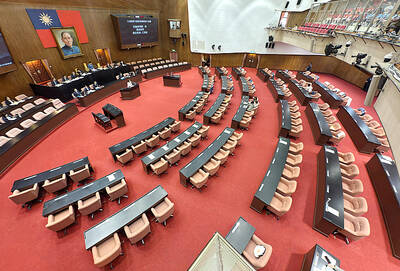Responsibility for certain budgets would shift to local governments, including school electricity fees, the Cabinet said yesterday, as it seeks to adjust spending to conform with changes to budget allocation rules passed earlier this year.
Support for local governments must be adjusted to avoid affecting major national defense, foreign affairs and economic policies, Executive Yuan spokeswoman Michelle Lee (李慧芝) quoted Premier Cho Jung-tai (卓榮泰) as saying during yesterday’s Cabinet meeting.
The adjustments would require local governments to take responsibility for expenditures such as school electricity fees, earthquake-proofing public buildings and some waste disposal, while the central government would still cover up to 50 percent of wastewater costs and road projects, he said.

Photo courtesy of the Executive Yuan
The central government would still be responsible for financing major policy projects, he added.
Amendments to the Act Governing the Allocation of Government Revenues and Expenditures (財政收支劃分法) passed by opposition lawmakers in December last year raised the ratio of government revenue allocated to local governments to 40 percent from 25 percent.
The government has since cut subsidies for local governments to make up for a financial shortfall caused by the reallocation, as well as by significant cuts opposition lawmakers made to the general budget.
Education groups expressed concern over the plan to shift the responsibility of a large portion of next year’s education budget to local governments, citing fears of insufficient labor and uneven budget allocations across the country, which could particularly affect rural or underprivileged areas.
The move could impact policies such as free tuition for high schools and subsidies for private universities, Education Public Service convener Hsieh Kuo-ching (謝國清) said.
The amendments would reallocate about NT$370 billion (US$12.1 billion) from the central government to local governments, including an NT$80 billion education budget, the groups said.
Local governments do not have the capacity to handle such a large influx of funding, and would struggle to adjust to new regulations and staffing issues in such a short time, they said.
When education funding becomes unstable, the first to bear the brunt are students from rural areas or from underprivileged backgrounds, Quality Learning Network convener Shen Chieh-yu (沈潔?) said.
As local governments are unsure how best to allocate the education budget, the move could affect citizens’ rights, Hsieh said.
He said that next year’s budget should follow this year’s model to avoid creating major disruptions.
Shen said he hoped the government would continue to prioritize education as a public investment.
Meanwhile, the Chinese Nationalist Party (KMT) criticized the Cabinet’s plan to change local subsidies to an “application-based” system, accusing the Executive Yuan of “forcing local governments to beg for subsidies.”
KMT caucus secretary-general Wang Hung-wei (王鴻薇), deputy caucus whip Lo Chih-chiang (羅智強) and Legislator Lai Shyh-bao (賴士葆) told a news conference that the Executive Yuan was trying to control local subsidies, saying that allocations would depend solely on President William Lai (賴清德) and the Cabinet.
Democratic Progressive Party spokeswoman Han Ying (韓瑩) said that the KMT is happy to take money, but not take action.
Following the amendments to the revenue allocation act, each administrative area has received more funds, she said.
The Taipei City Government’s allocation next year would increase by 64 percent, or NT$44.4 billion, while New Taipei City’s allocation would rise by 76 percent, or NT$41 billion, she said.
Despite the significant budget increases, Taipei Mayor Chiang Wan-an (蔣萬安) and New Taipei City Mayor Hou You-yi (侯友宜) continue to complain about lacking subsidies for school electricity fees, instead of allocating the extra funds to cover the expenses, Han said.
Hou said subsidies have long been allocated to each administrative area according to the law, although local governments hope the new system would not affect the legally required budgets for projects used to benefit disadvantaged groups, or related to education, police and firefighters.
Additional reporting by Chen Cheng-yu and Chung Li-hua

CROSS-STRAIT COLLABORATION: The new KMT chairwoman expressed interest in meeting the Chinese president from the start, but she’ll have to pay to get in Beijing allegedly agreed to let Chinese Nationalist Party (KMT) Chairwoman Cheng Li-wun (鄭麗文) meet with Chinese President Xi Jinping (習近平) around the Lunar New Year holiday next year on three conditions, including that the KMT block Taiwan’s arms purchases, a source said yesterday. Cheng has expressed interest in meeting Xi since she won the KMT’s chairmanship election in October. A source, speaking on condition of anonymity, said a consensus on a meeting was allegedly reached after two KMT vice chairmen visited China’s Taiwan Affairs Office Director Song Tao (宋濤) in China last month. Beijing allegedly gave the KMT three conditions it had to

‘BALANCE OF POWER’: Hegseth said that the US did not want to ‘strangle’ China, but to ensure that none of Washington’s allies would be vulnerable to military aggression Washington has no intention of changing the “status quo” in the Taiwan Strait, US Secretary of Defense Pete Hegseth said on Saturday, adding that one of the US military’s main priorities is to deter China “through strength, not through confrontation.” Speaking at the annual Reagan National Defense Forum in Simi Valley, California, Hegseth outlined the US Department of Defense’s priorities under US President Donald Trump. “First, defending the US homeland and our hemisphere. Second, deterring China through strength, not confrontation. Third, increased burden sharing for us, allies and partners. And fourth, supercharging the US defense industrial base,” he said. US-China relations under

The Chien Feng IV (勁蜂, Mighty Hornet) loitering munition is on track to enter flight tests next month in connection with potential adoption by Taiwanese and US armed forces, a government source said yesterday. The kamikaze drone, which boasts a range of 1,000km, debuted at the Taipei Aerospace and Defense Technology Exhibition in September, the official said on condition of anonymity. The Chungshan Institute of Science and Technology and US-based Kratos Defense jointly developed the platform by leveraging the engine and airframe of the latter’s MQM-178 Firejet target drone, they said. The uncrewed aerial vehicle is designed to utilize an artificial intelligence computer

The Chinese Nationalist Party (KMT) caucus yesterday decided to shelve proposed legislation that would give elected officials full control over their stipends, saying it would wait for a consensus to be reached before acting. KMT Legislator Chen Yu-jen (陳玉珍) last week proposed amendments to the Organic Act of the Legislative Yuan (立法院組織法) and the Regulations on Allowances for Elected Representatives and Subsidies for Village Chiefs (地方民意代表費用支給及村里長事務補助費補助條例), which would give legislators and councilors the freedom to use their allowances without providing invoices for reimbursement. The proposal immediately drew criticism, amid reports that several legislators face possible charges of embezzling fees intended to pay